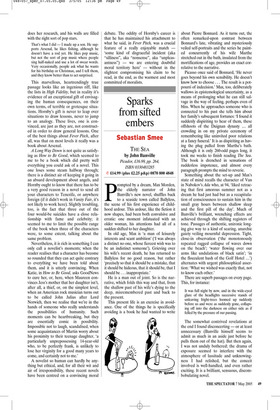Sparks from sifted embers
Sebastian Smee
THE SEA by John Banville Picador, £16.99, pp. 264, ISBN 0330483285 ✆ £14.99 (plus £2.25 p&p) 0870 800 4848 Prompted by a dream, Max Morden, the elderly narrator of John Banville’s new novel, shuffles back to a seaside town called Ballyless, the scene of his first experience of childhood ardour. This ardour, like the fiction it now shapes, had been both convulsive and erratic: one moment infatuated with an older woman, his attentions had all of a sudden shifted to her daughter.
In old age, Max is ‘a man of leisurely interests and scant ambition’ (‘I was always a distinct no one, whose fiercest wish was to be an indistinct someone’). Grieving over his wife’s recent death, he has returned to Ballyless for no good reason, but rather ‘precisely so that it should be a mistake, that it should be hideous, that it should be, that I should be . . . inappropriate.’ He is a man out of joint. So is the narrative, which folds this way and that, from the shallow past of his wife’s dying to the deep, misremembered past and back to the present.
This present life is an exercise in avoidance. One of the things he is specifically avoiding is a book he had wanted to write about Pierre Bonnard. As it turns out, the often remarked-upon contrast between Bonnard’s late, vibrating and mysteriously veiled self-portraits and the series he painted concurrently of his wife Marthe stretched out in the bath, insulated from the mortifications of age, provides an exact correlative to the narrative.
Picasso once said of Bonnard, ‘He never goes beyond his own sensibility. He doesn’t know how to choose . . . The result is a potpourri of indecision.’ Max, too, deliberately wallows in epistemological uncertainty, as a means of prolonging what he can still salvage in the way of feeling, perhaps even of bliss. When he approaches someone who is connected to his past she tells him about her family’s subsequent fortunes: ‘I found it suddenly dispiriting to hear of them, these offshoots of the Duignan dynasty ... all crowding in on my private ceremony of remembering like uninvited poor relations at a fancy funeral.’ It is as dispiriting as having the plug pulled from Marthe’s bath. Although it is only 260-odd pages long, it took me weeks to finish reading The Sea. The book is drenched in sensations of rudderless impotence, and almost every paragraph prompts the mind to reverie.
Something about the set-up and Max’s state of mind recalls the character of Van in Nabokov’s Ada who, at 94, ‘liked retracing that first amorous summer not as a dream he had just had but as a recapitulation of consciousness to sustain him in the small gray hours between shallow sleep and the first pill of the day’. Much of Banville’s brilliant, wrenching effects are achieved through the shifting registers of tone. Passages of authentic, unironic longing give way to a kind of searing, anarchic gaiety veiling mournful depression. Tight, close-in observation (‘the monotonously repeated ragged collapse of waves down on the beach’; ‘water flowing over our arms like undulations of black satin’; ‘in the flocculent hush of the Golf Hotel ...’) alternates with urgent philosophical assertion: ‘What we wished was exactly that, not to know each other.’ There are superb passages on every page. This, for instance:
It was full night by now, and in the wide-eyed glare of the headlights successive stands of unleaving fright-trees loomed up suddenly before us and were as suddenly gone, collapsing off into the darkness on either side as if felled by the pressure of our passing.
The somewhat contrived revelations at the end I found disconcerting — or at least unnecessary (Banville himself seems to admit as much in an aside just before he pulls them out of the hat). But then again, I was not unduly bothered; the drama of exposure seemed to interfere with the atmosphere of lassitude and unknowingness I had relished, but the conceit involved is well-handled, and even rather exciting. It is a brilliant, sensuous, discombobulating novel.



























































 Previous page
Previous page